In my present house, we too have a guava tree in our backyard. But because we are too lazy to wrap plastic bags around the fruits (yes my kids did not inherit my tree climbing skills), they tended to be infested by insects. My neighbour also complained about the mealy bugs that made him itch. He liked to relax bare body in his backyard which faced ours.
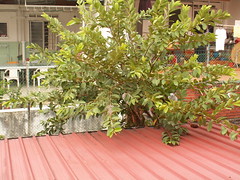
Photo of our guava tree taken from my bedroom window. Just a few months ago, we trimmed it bare.
That of course is the problem with land-scarce Singapore today. Even if you are fortunate enough to own a landed property, your home is likely to have very small compound; and if you wanted to plant fruit trees, you would not have much space left for other gardening activities. That was exactly what happened in my case.
One of the things that attracted me to my present house was this mango tree in the front garden, with huge fruits dangling at face level. For a several years, we enjoyed the huge tasty mangoes, which were so abundant that we used to give the extras to our relatives and friends. But about 5 years ago we had to chop it down because it grew too big and became quite impossible to maintain. Let me explain.
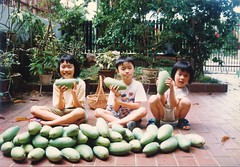
You see, for mangos, you have to spray pesticide when the tree is flowering. Otherwise, the insects will lay their eggs on the flowers and the insects will grow inside the fruit. So by the time you harvest the fruit, it may look very nice outside, but when you cut up the fruit, you will be startled by the crawling insects (weevil bugs) that emerge. Thus when our tree became too big, every time we sprayed pesticide on it, the wind would carry the poison into our neighbours’ homes. After a few seasons of harvesting fruits that were nice to look at but impossible to eat, we decided to chop it down.
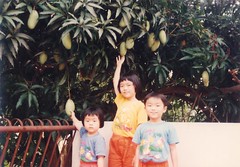
Our mango tree also attracted pests. I am not referring to the fruit bats, but the two legged kind. Often, we had taxi drivers who parked their vehicles outside our house and helped themselves to our fruits when my wife and I were at work. It’s very strange. Most of the fruits seemed to be found on the side facing the road. Maybe it’s the morning sun. We even had one filial man who came in his van one Sunday afternoon, equipped with poles and nets. I know he is filial because when I yelled at him from my balcony, he replied that his mother loved mangos. In the face of such unabashed filial piety, what could it do but desist. Anyway, I doubt he would believe me if I told him that, his mother was going to be treated to quite a sight when she cut open the fruits and see some crawling insects.
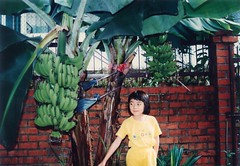
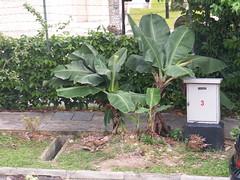
At first we planted these banana trees in our backyard. But as the kids got bigger and we ran out of space, we decided to plant them across the road from my house. The Bangladeshi workers from the nearby construction sites (all year round there are upgrading/renovation works in my neighbourhood) would certainly agree with our decision.
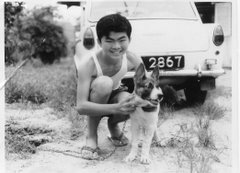




14 comments:
You keep hinting about the lack of space in your house. Are you trying to tell me something about the year-end function?
You also seemed to be quite biased against taxi drivers, Bangladeshis and filial sons.
Pity about your mango tree!
FYI my blog is now at http://www.fh2o.kuchingkayak.com instead of at blogger. Same old blog but different address.
Please update your bookmark and link. Thanks!
Being filial does not mean that a person can infringe on other people properties without permission. In ancient China, a filial son or daughter practically sold himself or herself, to be a life-time servant, in order to afford a decent burial for their parents.
Hi, I was blog hopping and came upon your blog.
I'm 21 yrs old now and back then, my granny lived in a terrace house which afforded her to grow a mango and papaya tree in the backyard.
I used to play with the fallen leaves of the papaya tree with my cousin and uncle. Can't remember if we ever ate any of its fruits, though.
Thank you for this entry. It really brought back wonderful memories. Made me realise how much I miss growing up in that old house.
Haha.. earlier sour rambutans.. maybe now a case of sour mangoes? Personally I find the mangoes from Pakistan the best I have tasted.. namely Chausa and Sindhiri.. maybe Chun See's mangoes tasted just as nice.. but a pity I did not get to eat them.....
Woa, u have green fingers Chun See. So sayang about the mango tree. My old office used to have this huge mango tree too. Sometimes the fruits would drop and we simply picked it up and eat it. No insects inside leh. And I don't think anyone of us civil serpents bother to spray insecticide leh.
Wah, landed-property complained not enough space. We heartlanders worse, right? tsk..tsk..tsk...
Not complaining lah .. very happy to be staying here. Just comparing life today with kampong life of yesterday and stating the realities.
It was only recently that I got to know that Chuck's favourite fruit was the mango; and yet all these years did not get to try ours. Sorry brudder!
I told him that so far I have not tasted any which is bought at fruit stalls that are better than my own. I think the reason is that we pluck ours when it is just ripe from the tree, whereas those in the market come from overseas, and are plucked when they are quite raw.
And how do you know when is the best time to pluck them? Answer - we never know, but apparently the birds do. So they moment you see a bird starting to peck at a mango, you know that is the perfect time.
I've been reading your blog for some time and I must say I have truly enjoyed being able to share your memories and reflections on your truly Singaporean past. You have experienced so many things that I have only read and wondered about, and I thank you for your personal, humorous perspective which has really brought these things to life for me in a unique way.
I am an actor, director and scriptwriter, and I am currently working with a family-focused theatre company on conceptualising a half-hour family show for the National Museum, to be performed in early December. The focus of the show is nostalgic, with songs from the good old days woven into the broad theme of family, friendship and giving.
As a child of the '70s, I have no personal memories of many of the things that I would like to feature in the show. I wonder if you would be willing to spare a little time to come in as a consultant, to advise my team on music and help with the scripting process so that we can authentically capture the memories that we are trying to recreate for the audience. Also, I am interested in possibly using some of the great photos you have put on your blog, with your permission of course.
I would appreciate it if you could contact me soon so that we can discuss this matter further. My e-mail address is terminalcase@gmail.com and I look forward to hearing from you.
Wah Chun See, another great job offer. *Looking on with green eyes*. Let me know if you can't manage, okay? I can help carry and move chairs. Flower pots too, anything. :p
Oh dear. I typed in my email address wrongly! I can't believe how silly that was. It's terminalcase42@gmail.com. Still looking forward to hearing from you. Sorry about that.
I've got to be honest with you Eleanor - your email address with the morbid words 'terminalcase' does not look very 吉利 (auspicious). What's more, you've added the figure 42 (死易)= "easy to die" in Cantonese. Chun See is Cantonese. So I am not surprised that you still have not heard from him yet.
I am not superstitious.
It seems that talking about the past has a future. Even PM emphazises the importance of telling stories to young people. Listening stories from an oldie could be extremely interesting but there is a catch. My uncle, in his eighties, from Malacca, when relating his stories to me can run up to 3 hours. I have to interrupt him and make a fast exit.
Post a Comment